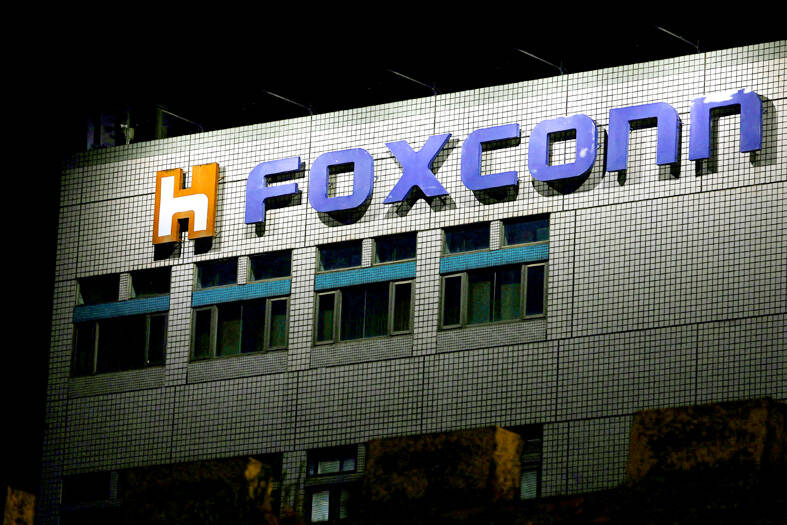Hon Hai Precision Industry Co (鴻海精密) has been fined NT$10 million (US$329,294) by the Ministry of Economic Affairs for not getting regulatory approval for its investment in a Chinese semiconductor company.
Hon Hai’s Shanghai-listed communication network equipment subsidiary Foxconn Industrial Internet Co (FII, 富士康工業互聯網) acquired a stake in Tsinghua Unigroup Co (清華紫光) in July last year without getting the green light from the Investment Commission.
FII disposed of the stake last month, but Hon Hai was still fined by the ministry, the company said in a filing on Thursday with the Taiwan Stock Exchange.

Photo: Reuters/Ann Wang
Hon Hai, known as Foxconn Technology Group (富士康科技集團) internationally, said it did not seek approval from the commission before the investment was made because the deal was completed through a complicated multi-layer structure that made it hard to control how the deal proceeded.
However, the commission said on Thursday that Hon Hai was fined because its indirect acquisition of an 8.23 percent stake in Tsinghua Unigroup without advance approval contravened the Act Governing Relations Between the People of the Taiwan Area and the Mainland Area (台灣地區與大陸地區人民關係條例).
The commission said that because Hon Hai disposed of the Tsinghua Unigroup stake it previously held, there was no concern over a possible technology leak to China that might affect Taiwan’s industrial development.
It also said the fine was reduced to NT$10 million from the up to NT$25 million stipulated by law because Hon Hai has invested about NT$20.4 billion in Taiwan over the past three years and created 7,943 jobs.
Hon Hai disclosed in July that FII’s Xingwei (Guangzhou) Industrial Investment Partnership Ltd (興微廣州產業投資) had bought a stake in Tsinghua Unigroup for 5.38 billion yuan.
Following the deal, Xingwei controlled a 48.91 percent stake in another Chinese company that held a 20 percent stake in Beijing Zhiguangxin Holding Co (北京智廣芯控股), which owned a 100 percent stake in debt-ridden Tsinghua Unigroup after a business restructuring.
Despite its complex structure, the deal raised concerns that it would help strengthen China’s chipmaking capability and compromise Taiwan’s national security, at a time when Taipei was forging closer ties with Washington amid escalating threats from Beijing.
Under pressure, Xingwei, which is 99.99 percent owned by FII, later reached an agreement to dispose of its stake in the company to Yantai Haixiu IC Investment Center (煙臺海秀積體電路產業投資中心) for no less than 5.38 billion yuan (US$793 million), Hon Hai said last month.
In its statement on Thursday, Hon Hai said the NT$10 million fine accounted for only 0.00015 percent of the company’s total sales last year and was unlikely to have any adverse impact on shareholders’ rights and its share price.
According to the commission, Hon Hai has promised to continue to invest in Taiwan over the next couple of years, and it will demand that Hon Hai honor its investment commitment.

BYPASSING CHINA TARIFFS: In the first five months of this year, Foxconn sent US$4.4bn of iPhones to the US from India, compared with US$3.7bn in the whole of last year Nearly all the iPhones exported by Foxconn Technology Group (富士康科技集團) from India went to the US between March and last month, customs data showed, far above last year’s average of 50 percent and a clear sign of Apple Inc’s efforts to bypass high US tariffs imposed on China. The numbers, being reported by Reuters for the first time, show that Apple has realigned its India exports to almost exclusively serve the US market, when previously the devices were more widely distributed to nations including the Netherlands and the Czech Republic. During March to last month, Foxconn, known as Hon Hai Precision Industry

Taiwan Semiconductor Manufacturing Co (TSMC, 台積電) and the University of Tokyo (UTokyo) yesterday announced the launch of the TSMC-UTokyo Lab to promote advanced semiconductor research, education and talent development. The lab is TSMC’s first laboratory collaboration with a university outside Taiwan, the company said in a statement. The lab would leverage “the extensive knowledge, experience, and creativity” of both institutions, the company said. It is located in the Asano Section of UTokyo’s Hongo, Tokyo, campus and would be managed by UTokyo faculty, guided by directors from UTokyo and TSMC, the company said. TSMC began working with UTokyo in 2019, resulting in 21 research projects,

Taiwan’s property market is entering a freeze, with mortgage activity across the nation’s six largest cities plummeting in the first quarter, H&B Realty Co (住商不動產) said yesterday, citing mounting pressure on housing demand amid tighter lending rules and regulatory curbs. Mortgage applications in Taipei, New Taipei City, Taoyuan, Taichung, Tainan and Kaohsiung totaled 28,078 from January to March, a sharp 36.3 percent decline from 44,082 in the same period last year, the nation’s largest real-estate brokerage by franchise said, citing data from the Joint Credit Information Center (JCIC, 聯徵中心). “The simultaneous decline across all six cities reflects just how drastically the market

Ashton Hall’s morning routine involves dunking his head in iced Saratoga Spring Water. For the company that sells the bottled water — Hall’s brand of choice for drinking, brushing his teeth and submerging himself — that is fantastic news. “We’re so thankful to this incredible fitness influencer called Ashton Hall,” Saratoga owner Primo Brands Corp’s CEO Robbert Rietbroek said on an earnings call after Hall’s morning routine video went viral. “He really helped put our brand on the map.” Primo Brands, which was not affiliated with Hall when he made his video, is among the increasing number of companies benefiting from influencer